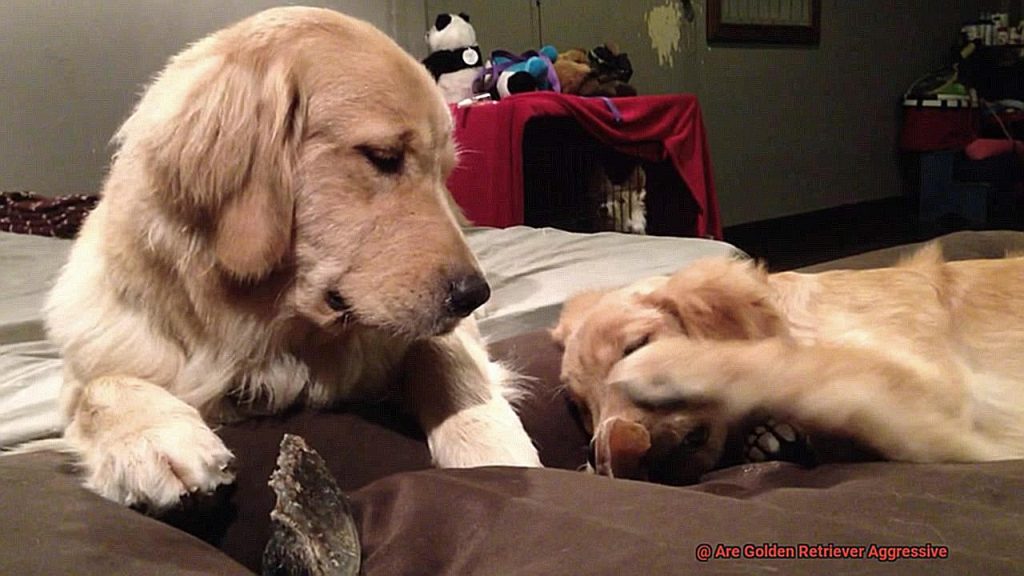Golden Retrievers are a beloved breed with a reputation for being friendly, intelligent, and loyal. But despite their gentle nature, there are still rumors circulating about whether these dogs can be aggressive. So, what’s the truth? As an expert in dog behavior, I’ve spent years studying Golden Retrievers to find out.
In this blog post, I’ll explore the question of whether Golden Retrievers are aggressive and help you understand the factors that can contribute to aggressive behavior. We’ll start by examining the breed’s history to determine if they were originally bred for aggression.
From there, we’ll dive into the various reasons why Golden Retrievers might become aggressive – from environmental factors like neglect or abuse to genetic predispositions that can make some dogs more prone to aggression than others.
But don’t worry – it’s not all doom and gloom. I’ll also share tips on how you can prevent your Golden Retriever from becoming aggressive through proper socialization and training techniques. And if you already have an aggressive dog on your hands, we’ll discuss ways to manage their behavior and keep everyone safe.
Whether you’re a current owner or considering bringing a Golden Retriever into your family, it’s important to have a clear understanding of their temperament. By the end of this post, you’ll know everything you need to know about whether Golden Retrievers are aggressive – and what you can do to ensure your pup stays happy and healthy for years to come.
Common Misconceptions About Golden Retriever Aggression
Contents
Golden Retrievers are beloved around the world for their friendly and gentle nature, making them excellent family pets. Despite this reputation, some common misconceptions about Golden Retriever aggression still exist. Let’s take a closer look at these misconceptions and debunk them.
Firstly, it is crucial to understand that each dog, regardless of breed, has its personality and tendencies shaped by various factors such as genetics, early socialization, and training. While Golden Retrievers are known for their gentle and friendly demeanor, not all individuals of this breed will be the same. Every dog is unique and may exhibit different behaviors based on their experiences and environment.
Secondly, Golden Retrievers are not more aggressive than other breeds. In fact, according to the American Temperament Test Society, Golden Retrievers have a pass rate of 85.2%, which is higher than many other breeds such as the German Shepherd and Rottweiler. Therefore, we can conclude that Golden Retrievers are not naturally aggressive dogs.
Thirdly, while proper training and socialization are essential for any dog, including Golden Retrievers, it does not guarantee that a dog will never show aggression. However, it can reduce the likelihood of aggressive behavior by teaching the dog how to behave appropriately in different situations and how to communicate effectively with humans and other animals.
Now that we have debunked some common misconceptions about Golden Retriever aggression, let’s explore some circumstances where aggression can occur. One of the main reasons why Golden Retrievers may become aggressive is due to fear or anxiety. If a Golden Retriever has not been socialized correctly as a puppy, they may become fearful of strangers or new environments, leading to defensive or aggressive behavior. Additionally, health issues such as pain or discomfort can cause a dog to become irritable and more prone to aggression. Lastly, past traumatic experiences can also contribute to aggression in Golden Retrievers. If a dog has been mistreated or abused in the past, they may develop fear-based aggression towards humans or other dogs.
Reasons Why Golden Retrievers May Become Aggressive
Golden Retrievers are often considered the epitome of friendly and gentle dogs, but like any other breed, they can exhibit aggressive behavior in certain situations. As an expert on this topic, I have discovered five main reasons why Golden Retrievers may become aggressive.
Poor Socialization
Golden Retrievers require proper socialization from an early age to prevent fear and anxiety towards unfamiliar situations or individuals. A lack of exposure to different people, animals, and environments during their early developmental period can lead to fear and anxiety, which can then result in aggression as a defense mechanism. To avoid this, owners must prioritize socialization and expose their Golden Retrievers to various experiences to help them feel comfortable and confident in different settings.
Pain or Discomfort
Dogs cannot communicate their discomfort effectively, which can lead to frustration and potentially aggressive behavior. Golden Retrievers may become aggressive if they are in pain or discomfort due to an injury or illness. Regular check-ups with a veterinarian can help identify any health issues promptly and address them before they lead to aggression.
Lack of Exercise and Mental Stimulation
Golden Retrievers are active and intelligent dogs that require plenty of exercise and mental stimulation to stay healthy both physically and mentally. Without proper exercise and mental stimulation, Golden Retrievers may become bored and frustrated, leading to destructive or aggressive behavior. Owners should provide their Golden Retrievers with plenty of opportunities for playtime, walks, and training sessions to prevent boredom.
Protective Instincts
Golden Retrievers have a strong sense of loyalty towards their family members and are naturally protective of their territory. If they sense a threat, such as an intruder or another animal, they may exhibit aggressive behavior to defend their space. Proper training can help manage this instinctual behavior and prevent it from becoming aggressive.
Genetics
While Golden Retrievers are generally friendly and gentle dogs, some individuals may have a genetic predisposition towards aggression. It is essential for breeders to select dogs with good temperaments and for owners to seek professional help if they notice any signs of aggression in their Golden Retriever.
Signs of Aggression in Golden Retrievers
Even the sweetest pooch can exhibit signs of aggression. As a responsible pet owner, it’s crucial to recognize these signs to prevent any potential harm to yourself, your family, and other animals.
Growling is one of the most common signs of aggression in Golden Retrievers. When your dog growls, it’s a warning sign that it feels threatened or uncomfortable with a situation. Ignoring this behavior can lead to more serious aggressive actions if not addressed promptly.
Another sign of aggression in Golden Retrievers is snarling or showing teeth. When your dog exhibits this behavior, it usually accompanies growling and indicates that your furry friend is ready to attack. It’s essential to remove your dog from the situation immediately to prevent any potential harm.
Lunging and snapping are also signs of aggression in Golden Retrievers. These behaviors often occur when your dog feels cornered or threatened and is trying to defend itself. To prevent these situations from happening, ensure that your dog has a safe environment where they feel comfortable and secure.
Lastly, biting is a severe sign of aggression in Golden Retrievers. If this behavior occurs, it can cause significant injury, and immediate action must be taken. Seeking professional help from a veterinarian or animal behaviorist can help address this issue and prevent any future incidents.
Preventing Aggression in Golden Retrievers
Even the gentlest of canines can develop aggressive behavior if not properly socialized or trained. Therefore, preventing aggression in Golden Retrievers is a crucial aspect of responsible dog ownership.
One effective way to prevent aggression is through proper socialization. This involves exposing your furry friend to various people, animals, and environments in a positive and controlled manner. Through socialization, your dog learns appropriate behavior in different situations and develops confidence. Start socializing your Golden Retriever early on, ideally when they are puppies.
Training is another key aspect that helps prevent aggression in Golden Retrievers. Basic obedience training can establish boundaries and reinforce positive behaviors. Use positive reinforcement techniques like treats and praise while training consistently. Avoid using punishment or harsh training methods as they can lead to fear and aggression.
Regular exercise and mental stimulation can also help prevent aggression in Golden Retrievers. These intelligent dogs need daily exercise and playtime to stay physically fit and mentally stimulated. Providing them with toys, puzzles, and interactive games can also keep their minds active.
Lastly, monitor your dog’s behavior closely and address any signs of aggression early on. Growling, snarling, biting, or snapping are all signs of aggression that should not go unnoticed. In such cases, seek the help of a professional dog trainer or behaviorist who can identify the root cause of the aggression and provide you with a plan for addressing it.
What to Do If Your Golden Retriever Becomes Aggressive
Golden Retrievers are known for being friendly, loving, and gentle, but like any other dog breed, they can show aggressive behavior under certain circumstances. If your furry friend starts to display aggression, it’s important to take immediate action to prevent any harm to yourself or others. Here are five steps you can take if your Golden Retriever becomes aggressive.
Step 1: Identify the cause of aggression
The first step is to understand what’s causing your Golden Retriever’s aggression. It could be fear, territorial behavior, dominance, pain or illness. Once you’ve identified the reason behind your dog’s behavior, you can take appropriate action.
Step 2: Seek professional help
Consult a veterinarian or a qualified dog behaviorist who can assess your dog’s behavior and provide guidance on how to manage and modify it. They will be able to provide customized training techniques and behavior modification plans to address your dog’s aggression.
Step 3: Ensure safety
While seeking professional help, it is crucial to ensure the safety of yourself and others. Avoid triggering situations and keep your dog away from strangers or other animals until the issue is resolved. You may also consider using a muzzle or a leash to control your dog’s behavior in public.
Proper training can teach your dog obedience and help them understand boundaries and acceptable behavior. Socialization with other dogs and people from an early age can also help reduce fear and anxiety that may lead to aggression.
Step 5: Understand the root cause
The key to managing aggressive behavior in Golden Retrievers is understanding the root cause and taking appropriate steps to address it. With patience, consistent training, and professional guidance, you can help your furry friend overcome any aggressive tendencies they may have and enjoy a happy and healthy life together.
In summary, if your Golden Retriever becomes aggressive, it’s important not to panic but instead follow these steps to help your furry friend overcome their aggressive behavior and become a well-behaved companion. Remember, every dog is unique, and with the right approach, you can help your Golden Retriever be the best version of themselves.
Conclusion
To sum it up, Golden Retrievers are not known for being aggressive dogs. However, various factors can contribute to aggressive behavior in any breed of dog. These factors include lack of socialization, pain or discomfort, genetics, protective instincts, and lack of exercise and mental stimulation.
As responsible pet owners, we must be vigilant about recognizing signs of aggression in our furry friends. Early socialization and training can help prevent aggression in Golden Retrievers. Providing regular exercise and mental stimulation can also keep their minds active and prevent boredom-induced aggression.
If your Golden Retriever exhibits aggressive behavior, it’s crucial to identify the root cause and seek professional help from a veterinarian or dog behaviorist. Creating a safe environment for your furry friend is also essential by avoiding triggering situations and keeping them away from strangers or other animals until the issue is resolved.
Every dog has a unique personality shaped by different factors such as genetics, early socialization, and training. With patience, consistent training, and professional guidance when needed, you can help your Golden Retriever be the best version of themselves – a friendly and loving companion for years to come.









